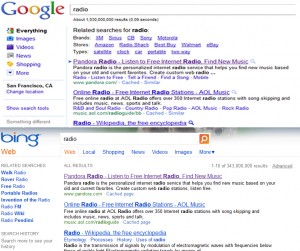Do a search of the word “radio” on either Google or Bing, and Pandora online radio is the first result. The runners up are also identical—AOL Radio, followed by Wikipedia’s “radio” entry.
I decided to do this experiment following Google’s charge that Microsoft’s Bing uses Google’s search results. Google says its staff came up with a host of “synthetic queries,” such as the nonsense word hiybbprqag, and found that the results were identical on Google and Bing.
Bottom line for Google:
“As we see it, this experiment confirms our suspicion that Bing is using some combination of:
- Internet Explorer 8, which can send data to Microsoft via its Suggested Sites feature
- the Bing Toolbar, which can send data via Microsoft’s Customer Experience Improvement Program
or possibly some other means to send data to Bing on what people search for on Google and the Google search results they click. Those results from Google are then more likely to show up on Bing. Put another way, some Bing results increasingly look like an incomplete, stale version of Google results—a cheap imitation.”
Microsoft denies this, it should be noted. Anyway, I don’t think Bing is copying Google searches when it comes to the word “radio.” Clearly the enormous popularity of Pandora is at play here.
The next three search results for Google are Liv e-365, NPR, and Radio-Locator. To Bing’s credit, the next three are a bunch of radio network HQ locations in my area (San Francisco, CA), Radio-Locator, and KSFS of San Francisco State University.
e-365, NPR, and Radio-Locator. To Bing’s credit, the next three are a bunch of radio network HQ locations in my area (San Francisco, CA), Radio-Locator, and KSFS of San Francisco State University.
Vive la difference!


